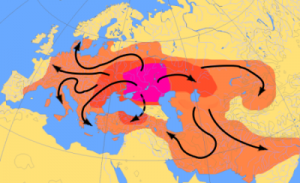A possible solution to one of the thorny questions in historical linguistics – where was the ancestor of many European and Indian languages of the Indo-European language family spoken – has been proposed using techniques normally enlisted in battling disesases. According to findings recently published, the parent “Proto Indo-European” originated in the Anatolia region of present-day Turkey.
The techniques used actually go back to work in 2003 by Russell Gray and Quentin Atkinson at the University of Auckland in New Zealand: ” Genes and words have several similarities, and language evolution has conventionally been mapped using a “family tree” format. Gray and Atkinson theorized that the evolution of words was similar to the evolution of species, and that the ‘cognate’ of words — how closely their sounds and meanings are related to one another — could be modelled like DNA sequences and used to measure how languages evolved.
By extension, the rate at which words changed — or mutated — could be used to determine the age at which Indo-European languages diverged from one another.” (Nature) The new study adds to the information about when the ancestor language was spoken with the new geographical information, by using ” the type of geography-based computer modelling normally used by epidemiologists to track the spread of disease” (Nature). Not all linguistis are convinced but as Aktinson comments in the article, it does point to a shift in acceptance of new methodologies in languistic research, indicating a “shift in attitudes towards computational-modelling approaches in historical linguistics, from being just an odd sideshow to a clear focus of attention”

